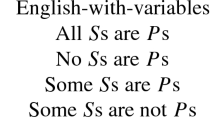Abstract
In this paper I present a formal language in which complex predicates stand for properties and relations, and assignments of denotations to complex predicates and assignments of extensions to the properties and relations they denote are both homomorphisms. This system affords a fresh perspective on several important philosophical topics, highlighting the algebraic features of properties and clarifying the sense in which properties can be represented by their extensions. It also suggests a natural modification of current logics of properties, one in which some complex predicates stand for properties while others do not.
Similar content being viewed by others
REFERENCES
Achinstein, Peter (1974): The identity conditions of properties, American Philosophical Quarterly 11: 257–275.
Armstrong, David (1978): Universals and Scientific Realism, Vol II. A Theory of Universals. Cambridge University Press, Cambridge.
Armstrong, David (1983): What is a Law of Nature? Cambridge University Press, Cambridge.
Armstrong, David (1989): Universals: An Opinionated Introduction, Westview Press, Boulder, Co.
Bealer, George (1982): Quality and Concept. Clarendon Press, Oxford.
Bealer, George (1994): Property theory: the type-free approach vs. the church approach, Journal of Philosophical Logic 23: 139–171.
Bigelow, John and Pargetter, Robert (1989): A theory of structural universals, Australasian Journal of Philosophy 67: 1–11.
Chierchia, Gennaro and Turner, Raymond (1988): Semantics and property theory, Linguistics and Philosophy 11: 261–302.
Cocchiarella, Nino (1986): Logical Investigations of Predication Theory and The Problem of Universals. Bibliopolis, Naples.
Forrest, Peter (1986): Ways worlds could be, Australasian Journal of Philosophy 64: 15–24.
Krantz, D., Luce, R., Suppes, P., and Tversky, A. (1971): Foundations of Measurement, Vol I. Academic Press, New York.
Leeds, Stephen (1978): Quine on properties and meanings, Southwestern Journal of Philosophy 9: 97–108.
Linsky, Bernard (1984): General terms as designators, Pacific Philosophical Quarterly 65: 259–276.
McMichael, Alan and Zalta, Edward (1981): An alternative theory of nonexistent objects, Journal of Philosophical Logic 9: 297–313.
Mellor, D. H. (1991): Matters of Metaphysics. Cambridge University Press, Cambridge.
Menzel, Chris (1986): A complete type-free second order logic of properties, relations, and propositions, Center for the Study of Language and Information, Technical Report #CSLI-86–40, Stanford University.
Menzel, Chris (1993): The proper treatment of predication in fine-grained intensional logic, Philosophical Perspectives 7: 61–87.
Quine, W. V. O. (1960): Variables explained away, Proceedings of the American Philosophical Society 104: 343–347.
Rosch, E. (1978): Principles of categorization, in Rosch, E. and Lloyd, B. (eds.), Cognition and Categorization. Lawrence Erlbaum, Hillsdale, N. J.: pp. 27–48.
Sober, Elliot (1982): Why logically equivalent predicates may pick out different properties, American Philosophical Quarterly 19: 183–189.
Shoemaker, Sidney (1980): Causality and Properties, in Peter van Inwagen (ed.), Essays in Honor of Richard Taylor. D. Reidel, Dordrecht: pp. 109–135.
Swoyer, Chris (1982): The nature of natural laws, Australasian Journal of Philosophy 60: 203–223.
Swoyer, Chris (1984): Causation and identity, Midwest Studies in Philosophy: Causation and Causal Theories 9: 593–622.
Swoyer, Chris (1991): Structural representation and surrogative reasoning, Synthese 87: 449–508.
Swoyer, Chris (1993): Logic and the empirical conception of properties, Philosophical Topics 21: 199–231.
Swoyer, Chris (1995): Leibniz on intension and extension, Noûs 29: 96–114.
Swoyer, Chris (1996): Complex predicates and conversion principles, forthcoming in Philosophical Studies.
Vlastos, Gregory (1974): A Note on ‘Pauline Predications’ in Plato, Phronesis 19: 95–101.
Zalta, Edward (1983): Abstract objects: an introduction to axiomatic metaphysics. D. Reidel, Dordrecht.
Zalta, Edward (1988): Intensional logic and the metaphysics of intentionality. MIT Press, Cambridge.
Author information
Authors and Affiliations
Rights and permissions
About this article
Cite this article
Swoyer, C. Complex Predicates and Logics for Properties and Relations. Journal of Philosophical Logic 27, 295–325 (1998). https://doi.org/10.1023/A:1004234204990
Issue Date:
DOI: https://doi.org/10.1023/A:1004234204990




